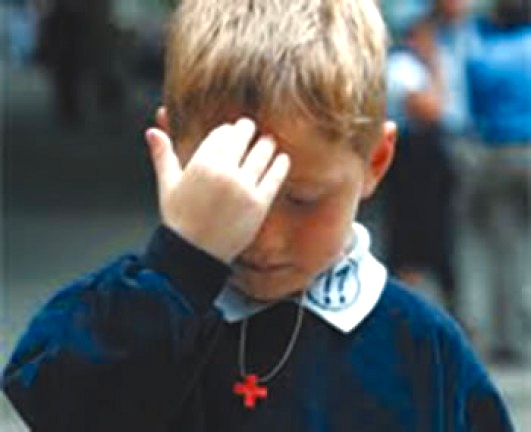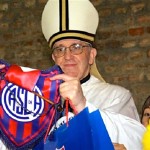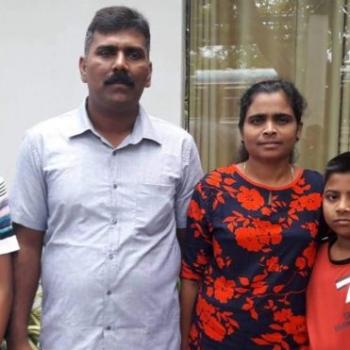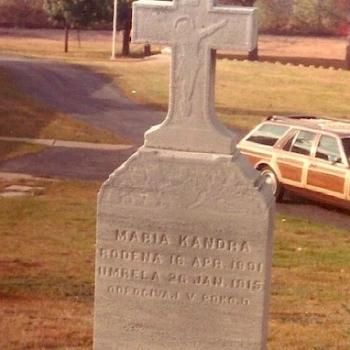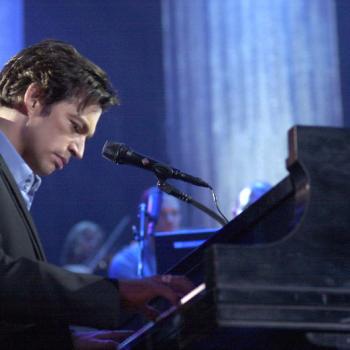One of my favorite parts of being a deacon is something most people never see:
Baptisms.
I usually do them every three months, in rotation with Fr. Passenant and Fr. Anthony. They’re usually small affairs, just a few dozen people, and it only takes a half hour or so. But it’s a chance to take part in something wondrous. They never fail to move me.
Baptisms are typically joyous occasions. It’s a day of tremendous possibility and hope – even more so, I think, than weddings. At a wedding, it’s often about the dress and the cake and the party. But at a baptism, it’s all about the baby. It’s about a new life being welcomed into the church. Even if a baby is crying its lungs out—and it happens more often than it doesn’t—nothing can go wrong. Because at that instant, that baby is perfect. Baptism, remember, makes each of us spotless. As the ritual puts it: we become a new creation.
And there is something very particular, very specific, about the baptism ritual. It is in the words that are spoken. We call it the Trinitarian Formula. Which is: “I baptize you in the name of the Father, and the Son and the Holy Spirit.” It’s not considered a valid baptism unless those words are used. When people come to us for RCIA and want to convert, one of the first things we need to check is if that person was baptized, and how. If those words were not a part of the ritual, the Catholic Church does not recognize those baptisms.
On this Trinity Sunday, if you want a reminder of how important the Trinity is, THAT is it. From the very beginning of our lives as Christians, we are sealed in the name of the Father and the Son and the Holy Spirit. . It signifies the extraordinary importance the Church places on this singular belief, this one great dogma: one God, in three persons.
It all comes down to Trinity.
That is one of the reasons we celebrate this feast, one week after Pentecost – the Trinity has been revealed to a waiting world—Father, Son and Spirit—and we mark this great gift.
You may have noticed that the words in the second reading are very familiar. From that letter we get the words the priest uses at the beginning of mass. He invokes the Trinity in a beautiful and meaningful way – God’s grace, Christ’s love, the Holy Spirit’s fellowship or communion. The priest offers it to us, and we proclaim it back to him.
But that’s not the first time we have mentioned the Trinity at this mass. This morning, as it always does, it began with something that most of us probably take for granted, and hardly think about. We do it so often.
It’s the sign of the cross.
In the name of the Father, and the Son and the Holy Spirit.
It’s not just a gesture that we use to punctuate prayer. It’s not just a sign of our Catholicity.
This is a re-statement of our baptism.
These are the words I speak during baptism…the words that were said over each of us as water was poured over our heads…the first words that made us members of the Body of Christ. Those words we speak again, and in effect, re-Christen ourselves. We brand ourselves with God in His three persons. And whatever we do or say after is in the name of the Father…and the Son…and the Holy Spirit.
We become icons of the Most Holy Trinity.
What an incredible gift.
What an incredible responsibility.
Just think of what that simple gesture means.
We touch our heads for the Father – the one whose mere idea, whose smallest thought, created us. This is where we began, in the mind of God.
We touch our hearts for the Son – the one whose unceasing love took him to the cross, and the one who taught us, as well, how to love through his own Sacred Heart.
We touch our shoulders for the Holy Spirit – the one who gives us strength, and who carries us on His shoulders — on His wings, if you will – and who enables us to be God’s arms, working on earth.
When we make the sign of the cross, and pray the sign of the cross with those words, we make of ourselves an offering, and a prayer. We embody what the Trinity represents. And we seek to bring that with our lives and with our actions to all those we meet.
We do it in the name of God – all that He is, all that He does.
We do it in the name of the Trinity.
Near the end of the baptism ritual, there is a beautiful moment when the parents receive a lit candle. The priest or deacon says to them “Receive the light of Christ.” Thinking about that moment, I’m reminded of something the great Anglican preacher John Wesley once said about the Trinity. He explained it this way: the Trinity is three candles, giving off one light.
Let us pray to live in that light – to always be drawn to it, and to always strive to give it to others. In the name of the one God in three persons …in the name of the Father, and the Son and the Holy Spirit.

